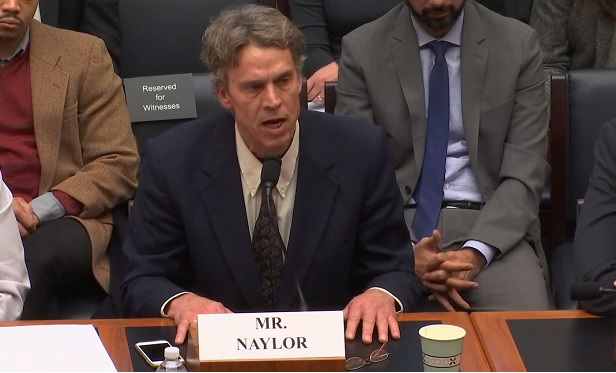 Bartlett Naylor (Credit: HouseFinancial Services Committee)
Bartlett Naylor (Credit: HouseFinancial Services Committee)
At least some members of the House Financial ServicesCommittee say that fake public commenters have hurt the integrityof the public comment processes for new federalregulations — including the U.S. Department of Labor'sfiduciary rule effort.
|The House Financial Services oversight subcommittee held ahearing on public comment integrity in Washington, lastweek. The subcommittee gave the hearing the title, "Fake It TillThey Make It: How Bad Actors Use Astroturfing to ManipulateRegulators, Disenfranchise Consumers and Subvert the RulemakingProcess."
|Rep. Al Green, D-Texas, the subcommittee chairman, said"astroturfing" is "the practice of creating the false appearance ofgrassroots support for a particular policy or position where noneexists, often to the benefit of shadowy, well-financed interests,and to the detriment of the general public."
|Witnesses talked about the effects of fake comments on effortsto develop environmental regulations, banking regulations, andfinancial services sales standards.
|Bartlett Naylor, a financial policy advocate at Public Citizen,gave a U.S. Department of Labor public comment period for thedepartment's fiduciary rule effort as an example of what he sees asmanipulation of the public comment process.
|Naylor said a business group claimed to have located severaldozen businesses that were afraid implementation of the LaborDepartment's fiduciary rule would lead to loss of their trustedfinancial advisors.
|"I called them all," Naylor said. "Some of them were, in fact,Wall Street brokers themselves. Others didn't answer thephone."
|One woman had said that her trusted advisor had helpedher grow her business, but, in reality, Naylor said, the woman saidshe had added just one employee over the last decade.
|"In other words," Naylor said, "these were pawns."
|The GAO study
Investigators at the Government Accountability Office,a congressional research service, looked into publiccomment process integrity for the subcommittee.
|Federal agencies propose about 3,700 regulations per year, andthey have to give members of the public a chance to comment on mostof those regulations, according to the GAO.
|One concern, GAO officials say, is that different agencies havedifferent rules for collecting and disclosing identifyinginformation about the commenters.
|"All selected agencies accepted anonymous comments," accordingto the GAO.
|Agencies also have different rules for what to do whencommenters submit the same, or very similar, comments, the GAOsays.
|Some agencies post each comment separately on the government'sRegulations.gov system, but some simply post oneexample of a mass-submitted comment, the GAO says.
|Possible solutions
Beth Simone Noveck, director of the Governance Lab at New YorkUniversity, testified that agencies could improve the publiccomment process by taking steps such as:
- Using artificial intelligence systems or other means to minevast piles of public comments for facts and ideas, and to reducethe impact of voluminous or duplicative comments.
- Creating mechanisms commenters can use to converse with oneanother and provide information and insights.
- Setting up a system similar to the United Kingdom's EvidenceCheck system, to crowdsource review of comments and evidence.
Resources
- Links to House Financial Services astroturfinghearing resources are available here.
- An article about financial professionals' effortsto comment on the Labor Department's fiduciary rule effort isavailable here and other commenters'suggestions here.
Complete your profile to continue reading and get FREE access to BenefitsPRO, part of your ALM digital membership.
Your access to unlimited BenefitsPRO content isn’t changing.
Once you are an ALM digital member, you’ll receive:
- Critical BenefitsPRO information including cutting edge post-reform success strategies, access to educational webcasts and videos, resources from industry leaders, and informative Newsletters.
- Exclusive discounts on ALM, BenefitsPRO magazine and BenefitsPRO.com events
- Access to other award-winning ALM websites including ThinkAdvisor.com and Law.com
Already have an account? Sign In
© 2024 ALM Global, LLC, All Rights Reserved. Request academic re-use from www.copyright.com. All other uses, submit a request to [email protected]. For more information visit Asset & Logo Licensing.








